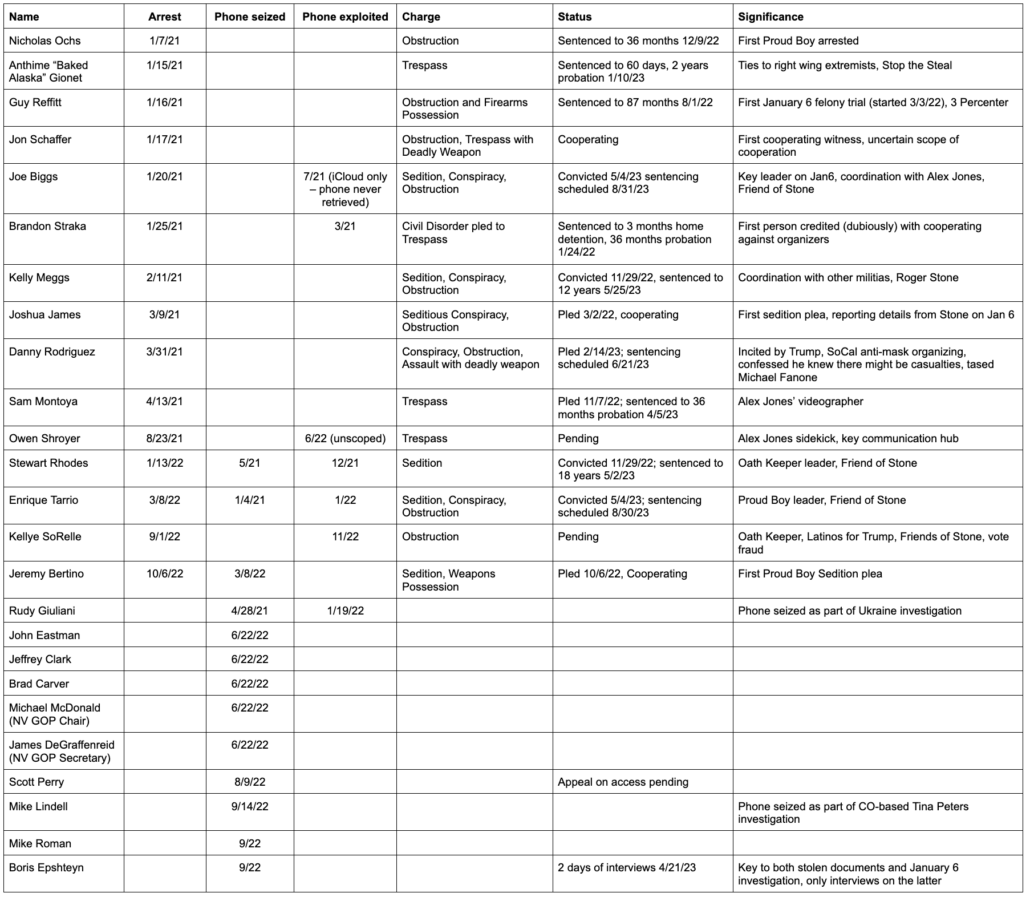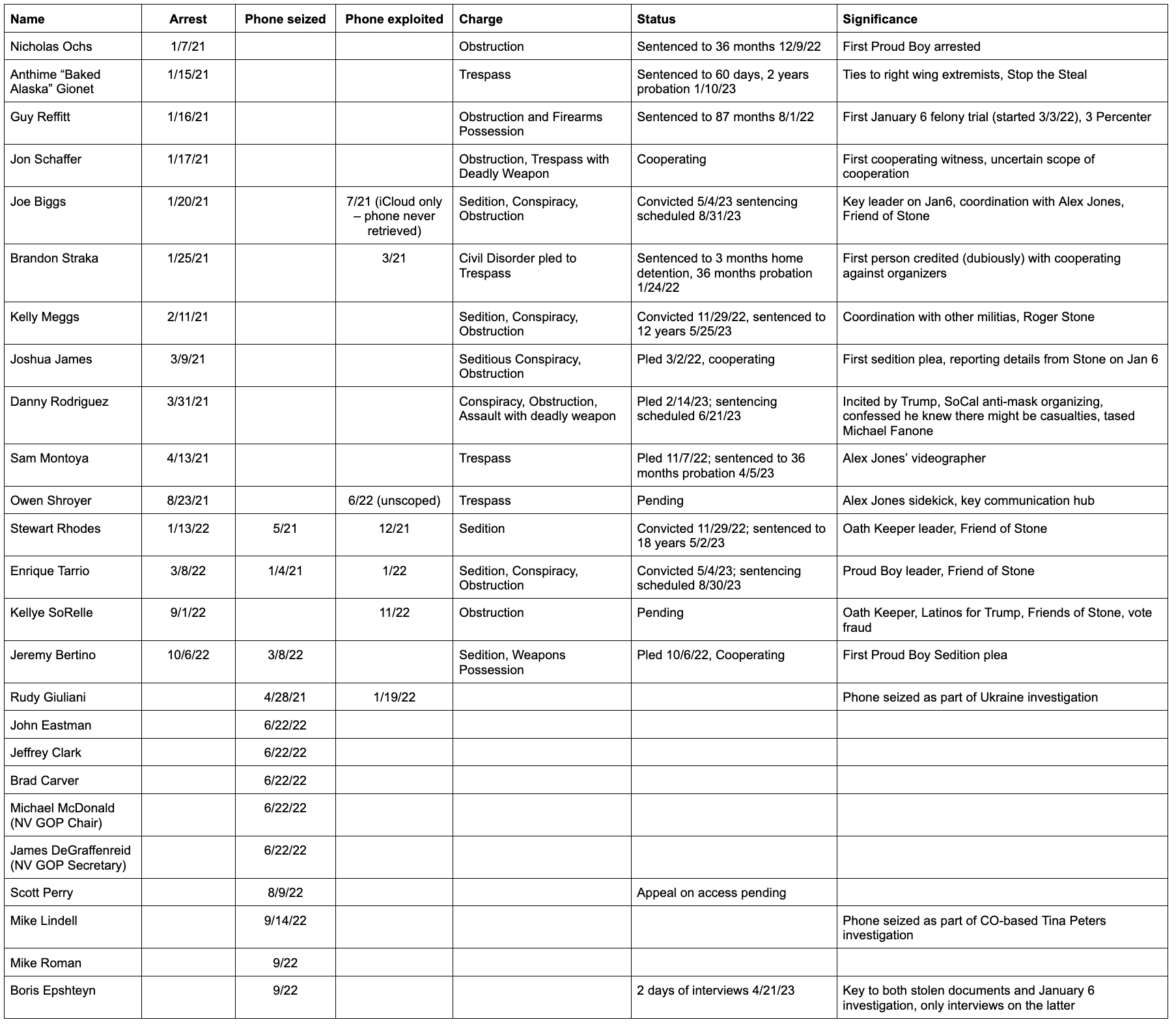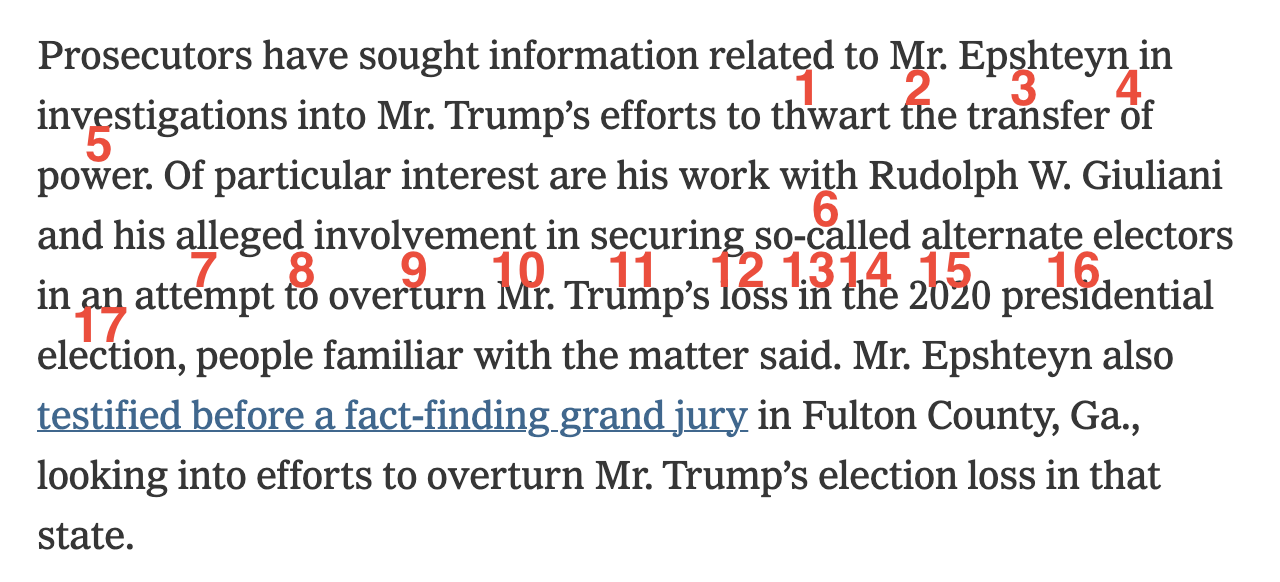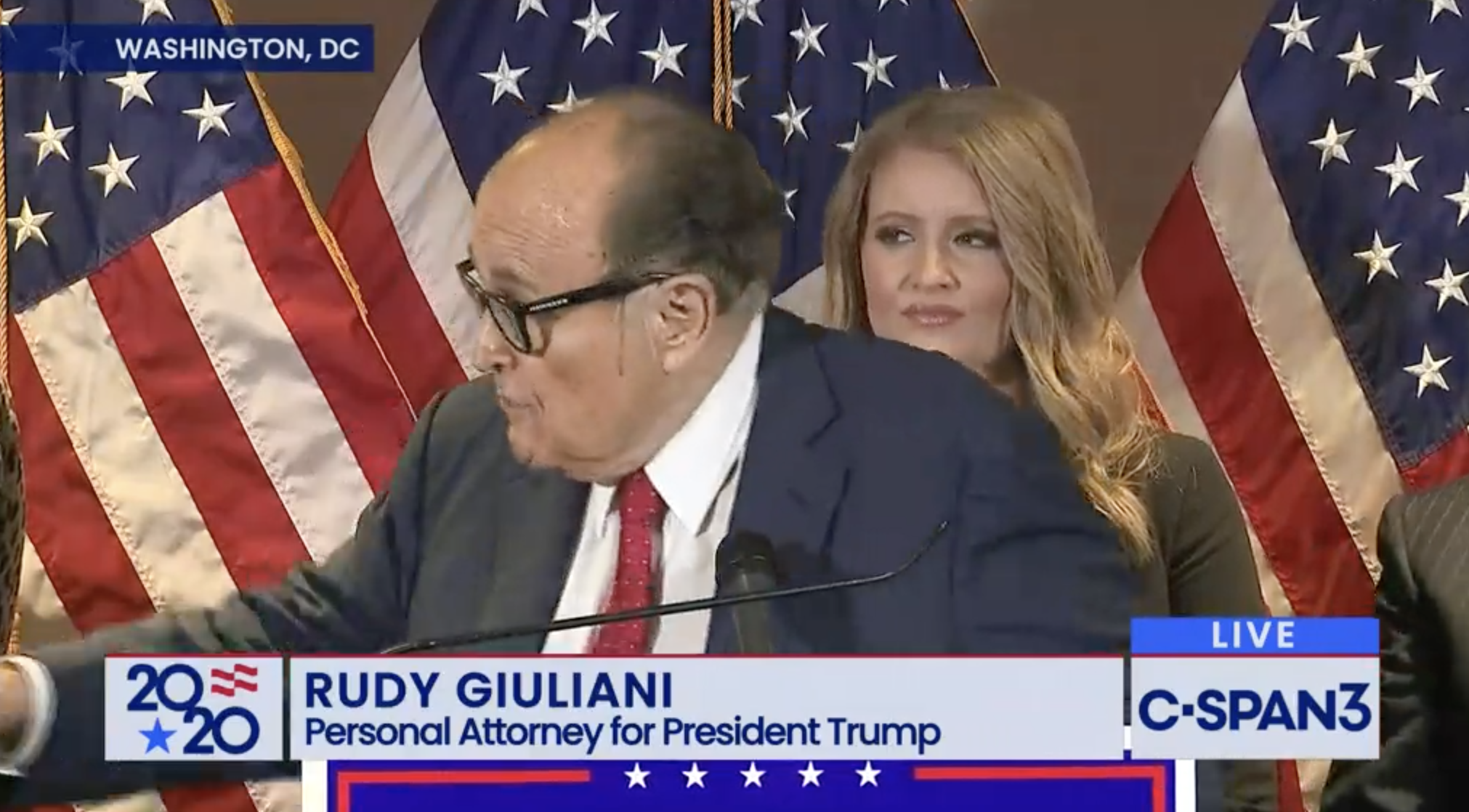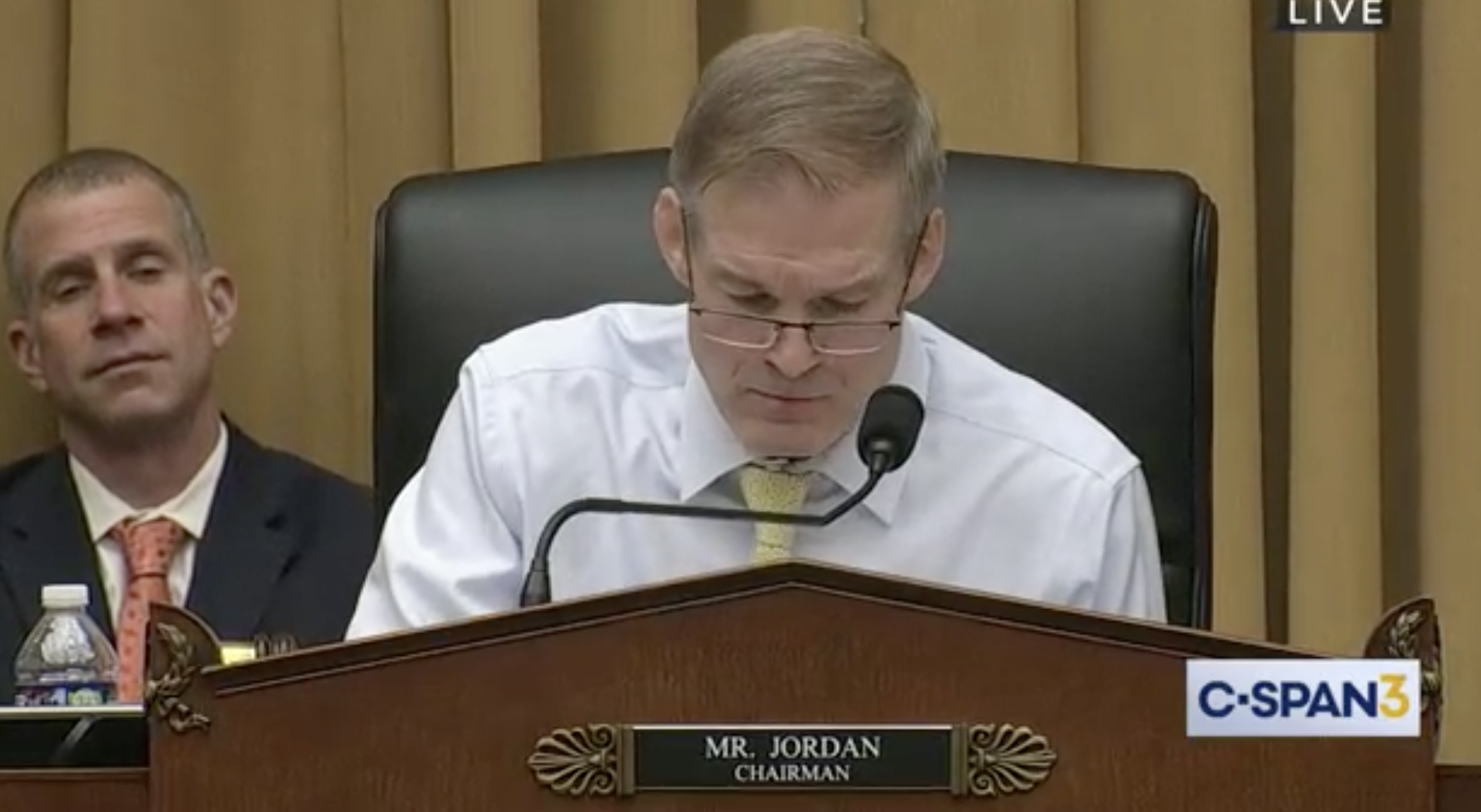A few weeks ago, Peter Baker marked the day that the January 6 investigation has taken as long as the time between the burglary to Nixon’s resignation.
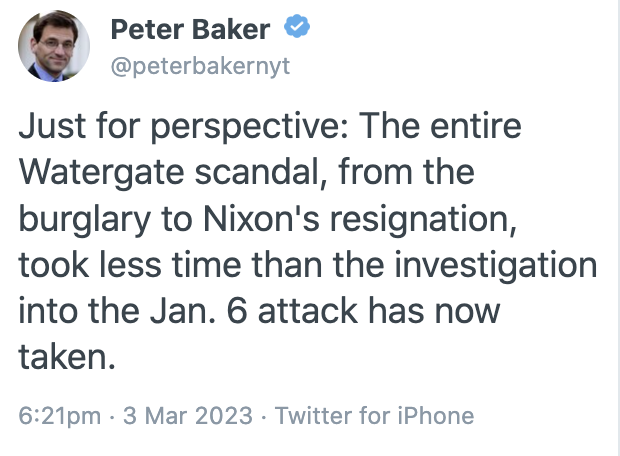
I reacted poorly to Baker’s claim to offer perspective; even on past presidential investigations, he has been overly credulous. And there’s really no comparison between Watergate and January 6, particularly if one compares — as Baker does — time-to-resignation under a still-sane Republican party with time-to-indictment in the MAGAt era. The comparison offers no perspective.
But I thought I’d take Baker up on the challenge, because the Watergate investigation offers a worthwhile way to demonstrate several of the reasons why the January 6 investigation is so much harder. (I plan to make running updates of this post because I expect feedback, particularly from people who know the Watergate investigation better than me, will help me fine tune this explanation.)
Same day arrests
In Watergate, the burglars were arrested in the act of breaking into the DNC headquarters.
On January 6, the cops tried to (and in a relative handful of cases, did) arrest people onsite. But this is the challenge they faced when they tried: Every attempted arrest required multiple officers to focus on one individual rather than the mob of thousands poised to invade the Capitol; every arrest was a diversion from the effort to defend the Capitol, Mike Pence, and members of Congress, with a woefully inadequate force.
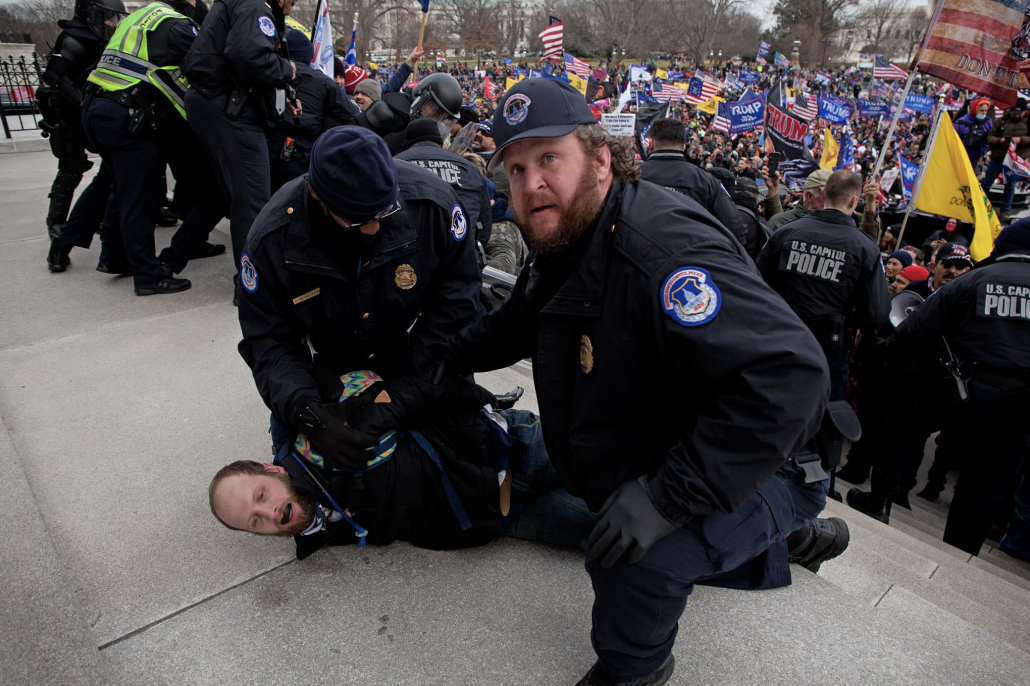
In the case pictured above, the cops made a tactical decision to let Garret Miller go. After assuring the cops he only wanted to go home, just 33 minutes later, Miller burst through the East door with the rest of the mob.
There wasn’t a great delay in arrests of January 6 rioters, though. Nicholas Ochs, the first Proud Boy arrested, was arrested on January 7 when his flight home from DC landed in Hawaii.

Q-Shaman Jacob Chansley was arrested on January 8. The first person who would be convicted of a felony by a jury, Guy Reffitt, was arrested on January 15 (his son had tipped the FBI about him before the attack). The first person known to later enter into a cooperation agreement, Jon Schaffer, was arrested on January 17. Miller, pictured above, was rearrested January 20. VIP Stop the Steal associates Brandon Straka and Anthime “Baked Alaska” Gionet — the former of whom did provide and the latter of whom likely provided useful information on organizers to earn misdeamenor pleas — were arrested on January 25 and January 17, respectively. Joe Biggs — now on trial for sedition and an utterly critical pivot between the crime scene and those who coordinated with Trump — was arrested January 20, the same day that Joe Biden would, under tight security, be sworn in as President, the same day Steve Bannon’s last minute pardon was announced.
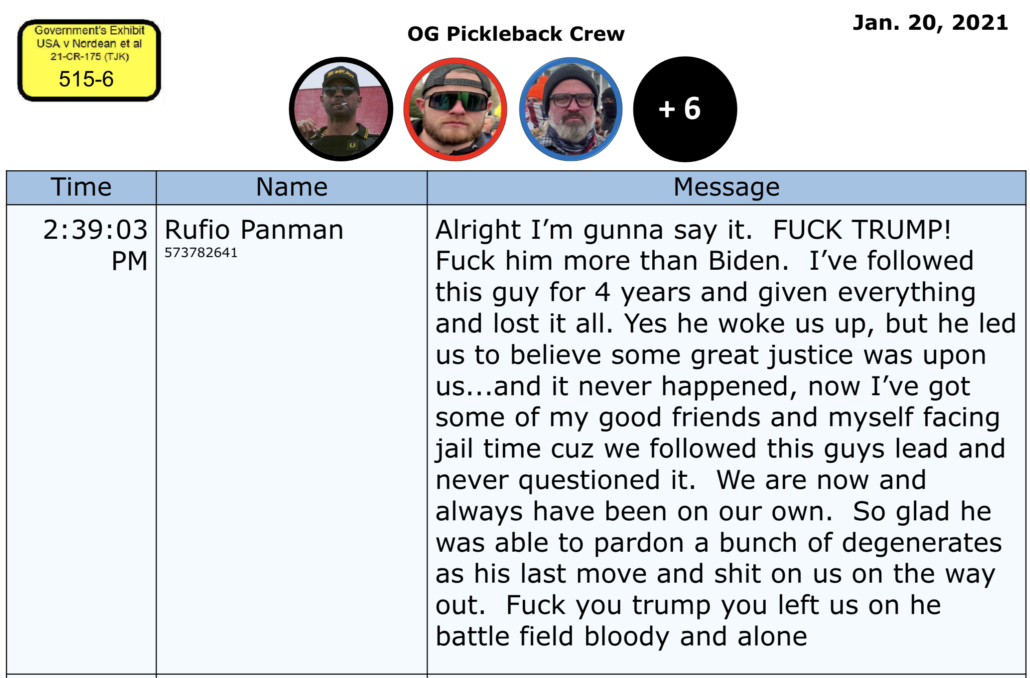
Kelly Meggs, the Oath keeper who facilitated cooperation among three militias who was convicted with Stewart Rhodes of sedition last November, was arrested on an already growing conspiracy indictment on February 19.
In the first month then, DOJ had already taken steps in an investigation implicating those who worked with Trump. The table below includes the arrests of some of the witnesses who will have an impact on an eventual Trump prosecution. There are others that I suspect are really important, but their role is not yet public.
Trial delays
The Watergate burglars didn’t go to trial right away. They were first indicted on September 15, 1972, 90 days after their arrest. Those who didn’t plead out went on trial January 8, 1973, 205 days after their arrest. Steps that John Sirica took during that trial — most notably, refusing to let the burglars take the fall and reading James McCord’s confession publicly — led directly to the possibility of further investigation. Nixon wouldn’t even commit his key crimes for over two months, in March.
That’s an important reminder, though: the Watergate investigation would have gone nowhere without that trial. That’s unsurprising. That’s how complex investigations in the US work.
Many people don’t understand, though, that there were two major delays before anyone could be brought to trial for January 6. First, COVID protocols had created a backlog of trials for people who were already in pretrial detention and for about 18 months, would limit the number of juries that could be seated. Efforts to keep grand jury members safe created similar backlogs, sometimes for months. In one conspiracy case I followed, prosecutors were ready to supersede several defendants into a conspiracy in April 2021, but did not get grand jury time to do so until September.
To make that bottleneck far, far worse, the nature of the attack and the sheer volume of media evidence about the event led DOJ to decide — in an effort to avoid missing exculpatory evidence that would undermine prosecutions — to make “global production” to all defendants. That required entering into several contracts, finding ways to package up media that started out in a range of different formats, getting special protective orders so one defendant wouldn’t expose personal details of another (though one defendant is or was under investigation for doing just that), then working with the public defenders’ office to effectively create a mirror of this system so prosecutors would have no access to defense filings. It was an incredibly complex process necessitated by the thing — the sheer amount of evidence from the crime scene — that has made it possible to prosecute so many of the crime scene culprits.
Here’s one of the memos DOJ issued to update the status of this process, one of the last global updates. Even at that point over a year after the attack, DOJ was just starting to move forward in a few limited cases by filling in what remained of discovery.
The first felony trial coming out of January 6 was that of Guy Reffitt, which started on March 3, 2022, a full 420 days after the event. Bringing him to trial that was made easier — possible even — because Reffitt never went into the Capitol itself, so didn’t have to wait until all global discovery was complete, and because there were several witnesses against him, including his own son.
The delays in discovery resulted in delays in plea deals too, as most defense attorneys believed they needed to wait until they had seen all of the discovery to make sure they advised their client appropriately.
Lots of people thought this process was unnecessary. But the decision to do it was utterly vindicated the other day, as DOJ started responding to defendants claiming that Tucker Carlson had found video that somehow proved their innocence. As I noted, prosecutors were able to point to the video shown by Tucker Carlson that he said vindicated Jacob Chansley and describe specifically when an unrelated defendant, Dominic Pezzola, had gotten what was effectively Chansley’s discovery.
The footage in question comes from the Capitol’s video surveillance system, commonly referred to as “CCTV” (for “closed-circuit television”). The Court will be familiar with the numerous CCTV clips that have been introduced as exhibits during this trial. The CCTV footage is core evidence in nearly every January 6 case, and it was produced en masse, labeled by camera number and by time, to all defense counsel in all cases.3 With the exception of one CCTV camera (where said footage totaled approximately 10 seconds and implicated an evacuation route), all of the footage played on television was disclosed to defendant Pezzola (and defendant Chansley) by September 24, 2021.4 The final 10 seconds of footage was produced in global discovery to all defense counsel on January 23, 2023. Pezzola’s Brady claim therefore fails at the threshold, because nothing has been suppressed. United States v. Blackley, 986 F. Supp. 600, 603 (D.D.C. 1997) (“For an item to be Brady, it must be something that is being ‘suppress[ed] by the prosecution.’”) (quoting Brady v. Maryland, 373 U.S. 83, 87 (1963)).
While discovery in this case is voluminous, the government has provided defense counsel with the necessary tools to readily identify relevant cameras within the CCTV to determine whether footage was produced or not. Accordingly, the volume of discovery does not excuse defense counsel from making reasonable efforts to ascertain whether an item has been produced before making representations about what was and was not produced, let alone before filing inaccurate and inflammatory allegations of discovery failures.
You may think the thirteen month delay for discovery was a waste of time. But it just prevented Tucker Carlson from being able to upend hundreds of prosecutions.
Obviously, most of the trials that have occurred in the last year won’t directly lead to Trump. Some will. I’ve said for 22 months that I think the Proud Boy trial is critical — and that won’t go to the jury for another two or three weeks yet. There are a number of steps that, I suspect, DOJ has been holding on pending the results of that trial, because so much else rides on it.
The Stewart Rhodes trial was likely helpful. I’ve suggested DOJ may use Danny Rodriguez as a way to tie Trump and Rudy Giuliani to the near-murder of Michael Fanone on an aid-and-abet theory. And there are a few more sleeper cases that seem to have greater significance than what went on at the Capitol that day.
Update: On May 4, 2023, a jury found four of the five Proud Boy leaders guilty of sedition. This trial was an important precursor for other investigative steps.
The legal uncertainty
In the Nixon case, there were fairly well established crimes: burglary, and obstruction of a criminal investigation.
I won’t say too much on this point, because I already have. But in this case, prosecutors were (and undoubtedly still are) trying to apply existing statute to an unprecedented event. One law they’ve used with a lot of the rioters — civil disorder — was already being appealed elsewhere in the country when prosecutors started applying to the January 6. Since then its legal certainty has been all-but solidified.
Far more importantly, the way prosecutors have applied obstruction of an official proceeding, 18 USC 1512(c)(2), has been challenged (starting with Garret Miller–the guy in the aborted arrest photo above) for over a year. That’s precisely the crime with which the January 6 Committee believes Trump should be charged (I advocated the same before their investigation even started in earnest); but I’m not sure whether Jack Smith will wait until the appeals on the law get resolved.
Still, DOJ has spent a great deal of time already trying to defend the legal approach they’ve used with the investigation.
Update: On April 7, the DC Circuit reversed Carl Nichols, holding that 18 USC 1512(c)(2) does not require a documentary component. That opinion raised new questions about the meaning of “corrupt purpose” under the statute. The Circuit rejected Fischer’s request for a rehearing, clearing the possibility of an appeal to SCOTUS. On May 11, the DC Circuit heard Thomas Robertson’s challenge to the same statute. Its decision in that case will almost certainly be the first DC Circuit ruling on “corrupt purpose” under the statute.
The insider scoop
For all the delays in setting up the January 6 Committee, it (and an earlier Senate Judiciary Committee inquiry into Jeffrey Clark’s efforts to undermine the vote) got started more quickly than Sam Ervin’s committee, which first started 11 months after the burglary.
Yet it only took Ervin’s Senate investigators about two months to discover their important insider, whose testimony would provide critical to both Congressional and criminal investigators. On July 13, 1973, Alexander Butterfield first revealed the existence of the White House taping system.
For all the January 6 Committee’s great work, it wasn’t until her third interview, on May 17, 2022, before Cassidy Hutchinson began to reveal more details of Trump’s unwillingness to take steps against his supporters chanting “Hang Mike Pence.” Even Hutchinson’s remarkable public testimony on June 28, 2022, when she described Trump demanding that his supporters be allowed to enter the Ellipse rally with the weapons Secret Service knew them to be carrying, is not known to have provided the kind of Rosetta stone to the conspiracy that disclosure of Nixon’s White House taping system did. In later testimony, Hutchinson provided key details about a cover-up. And her testimony provided leverage for first J6C and then, in at least two appearances, grand jury testimony from Pat Philbin and Pat Cipollone, the latter appearance of which came with an Executive Privilege waiver on December 2, 2022, 23 months after the attack.
Cell-xploitation
This brings us to the biggest difference in the timeline. Once the Senate and prosecutors learned that Nixon had effectively wiretapped himself, it turned the investigation into a fight over access to those materials.
The parts of the draft Nixon indictment that have been released describe a fairly narrow conspiracy. The proof against Nixon would have comprised, in significant part:
- The report John Dean did disclaiming a tie to the break-in
- Proof of payments to Howard Hunt
- White House recordings, primarily from several days in March 1973, proving that Nixon had the payments arranged
That is, in addition to the James McCord confession and John Dean’s cooperation, any charges against Nixon relied on recordings Nixon himself had made, the import of which were made all the more salient with the disclosure of the 18-minute gap.
One thing likely made the January 6 prosecution easier: The sheer amount of data available to prosecutors using subpoenas. We have yet to see any of that with regards to organizers (though we know that Denver Riggelman, with far weaker subpoena power, was able to do a detailed map of ties between Trump, organizers, and mobsters).
There will undoubtedly be a great deal of evidence obtained from cloud companies. The only hint of this process we know about yet involves the emails from Jeffrey Clark, Ken Klukowski, John Eastman, and one other person, who is not a lawyer. DOJ had obtained emails from them with a warrant by last May. They have undoubtedly done the same for dozens of other subjects (beyond those arrested from the crime scene, where they have done so as well), but we won’t know about it until we see it in indictments.
But even that is not always easy. DOJ has spent seven months so far getting Peter Navarro to turn over emails from his Proton Mail account covered by the Presidential Records Act. Judge Colleen Kollar-Kotelly just issued an order requiring him to turn the emails over, but it’s not clear whether he’ll further obstruct this effort to simply enforce his normal record-keeping obligations.
But one challenge that didn’t exist fifty years ago makes prosecutors jobs much harder: the need to obtain and exploit individual cell phones to obtain encrypted communications — things like Signal and Telegram chats — not otherwise available. In Enrique Tarrio’s case, simply breaking into the phone took most of a year. In Rudy Giuliani’s case (his phones were first obtained in the Ukraine investigation starting on Lisa Monaco’s first day on the job, but the results would be available with a separate warrant here), it took a nine month Special Master review. In Scott Perry’s case, his speech and debate claims will be appealed to SCOTUS. The table below shows whose phones we know to have been obtained, including how long it took to exploit the phones to the extent that became public (It does not show known cloud content obtained; much of that remains secret.)
The point being, even for the Proud Boys and Oath Keeper cases, you had to get one phone, use it to get probable cause on the next guy, then get his phone to use it to get probable cause on the next guy. This process is very obviously at the stage where both Alex Jones and Roger Stone would be in prosecutors’ sights, as well as much of the fake elector plot. But that’s still several steps away from people like Mark Meadows, who would necessarily be involved in any Trump prosecution.
Privilege
When DOJ subpoenaed the two Pats last summer, multiple media outlets reported that subpoenaing the White House counsels was particularly “aggressive.”
Two top lawyers who worked in the White House under former President Donald Trump have been subpoenaed to appear before a federal grand jury investigating the events leading up to the Jan. 6, 2021, attack on the Capitol, people familiar with the matter said, in the latest sign that the Justice Department’s probe is entering a more aggressive phase.
Mr. Trump’s White House counsel Pat Cipollone and his deputy Pat Philbin received subpoenas in recent days seeking documents and testimony, the people said. [my emphasis]
But as coverage of, first, Mike Pence’s two aides and, then, the two Pats being compelled to testify about topics Trump had claim was privileged noted, it’s not actually a new or particularly aggressive thing to ask White House counsels to testify. Indeed, John Dean’s cooperation — the most important part of holding Nixon accountable — arose after he had gotten himself deeper and deeper into Nixon’s cover-up.
And in spite of the Nixon precedent that said there were limits to Executive Privilege, and in spite of the DC Circuit ruling that the import of investigation January 6 overcame Trump’s Executive Privilege claims, even with Congress, Trump has used — and DOJ has been obligated to navigate — a series of privilege claims to delay the investigation.
As I’ve noted, there are close to thirty key witnesses or subjects whose attorney-client claims have to be carefully addressed to avoid blowing both that case and those of any downstream investigation.
In the case of Scott Perry, DOJ has spent six months trying to get into his phone. That delay is not a sign of lassitude. On the contrary, it’s a sign they’re including subjects who very rarely get investigated in the investigation.
Update: On April 21 and 22, seven-plus months after DOJ seized his phone (which is often how long exploitation takes), Boris Epshteyn spent two days interviewing with Jack Smith’s prosecutors though not — at least by description — appearing before the grand jury. He played a key role in both January 6 and the stolen documents case.
Cooperating witnesses
According to this timeline, John Dean started cooperating on April 6, 1973, almost ten months after the arrest of the burglars, though just a few weeks after the day of Nixon’s crimes as alleged in the draft indictment.
As noted on this table, there were people who entered into cooperation agreements more quickly than that, but it’s not clear who of them will help prosecute those closer to Trump. As I keep noting, I’m really dubious of the value of Brandon Straka’s cooperation.
There are maybe 30 to 35 known known cooperators in January 6, but most only cooperated against their buddies, and most of those prosecutions didn’t much build prosecutions related to Trump.
This table only includes a few of the cooperating witnesses — the first (Schaffer, the nature of whose cooperation is still totally obscure), the dubious cooperation of Straka and, potentially, Gionet, the most important of at least five Proud Boy cooperators, Jeremy Bertino, and the most important of at least eight Oath Keeper cooperators, Joshua James.
James, along with a few of the other Oath Keeper cooperators, might help prosecute Roger Stone. But there is no one on this list who has the goods on Trump, like John Dean did. No one even close.
That said, we wouldn’t necessarily know if someone closer to Trump were cooperating. Even some people who are secondary cooperators remain entirely obscure, both that they are cooperating, and the extent of their knowledge. I suspect several people are cooperating — I even have specific people in mind, based on other details. But we won’t know anytime soon if someone has flipped on Donald Trump.
And given the ferociousness of his supporters and the aggressiveness of Trump’s obstruction that’s a good thing.
Update, May 26: I’ve updated the table below to reflect the Oath Keeper sentences and the Proud Boy verdict.
